Category: Dental Implants
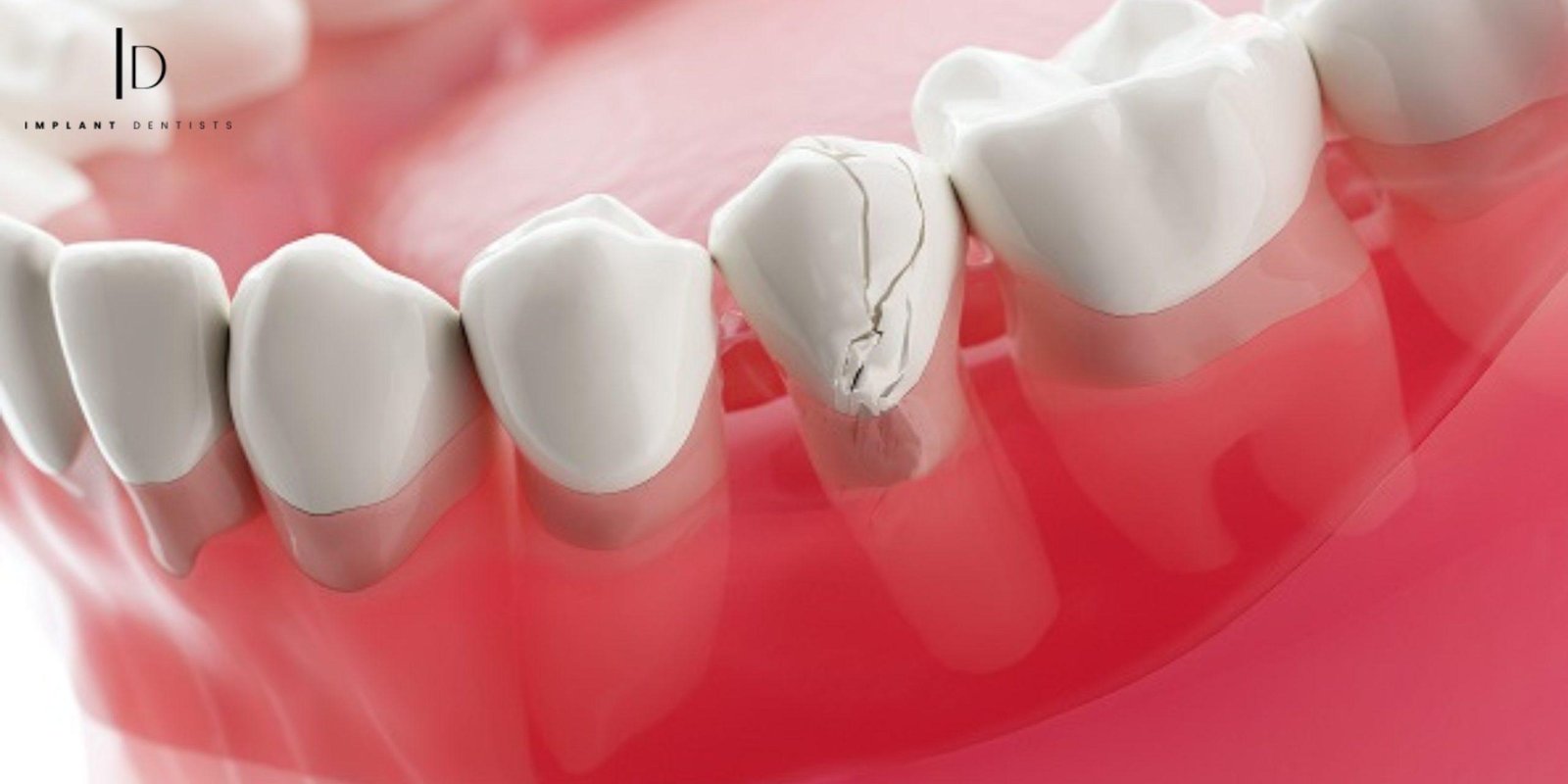
The Complete Guide to Repairing Broken Teeth| Causes, Types, and Treatment Options
February 16, 2024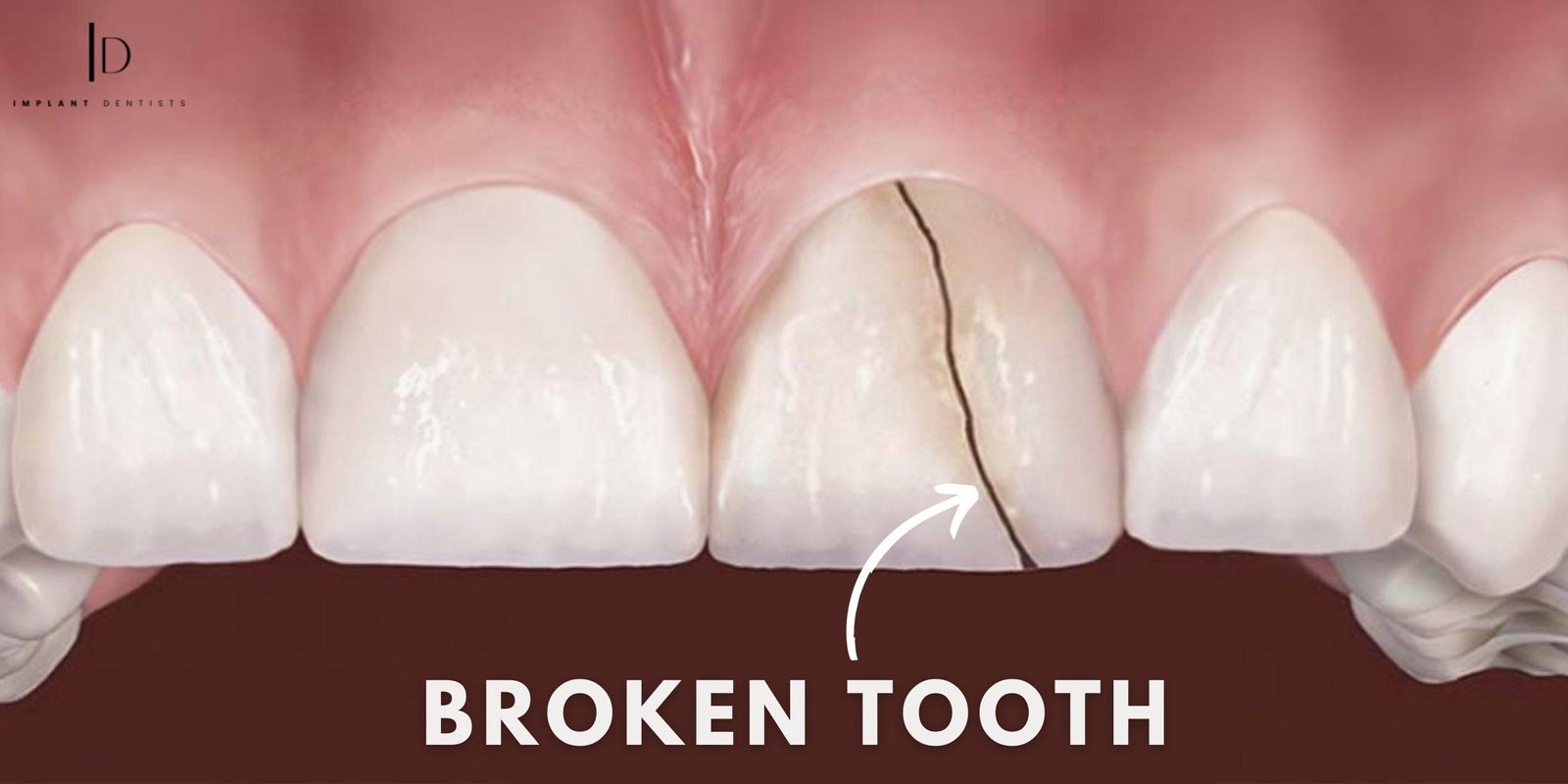
Saving Smiles| Exploring 5 Causes, Treatments & Benefits for Broken Tooth
February 5, 2024A broken tooth can be a worry and painful experience, affecting not just your oral health, but also your confidence in showcasing your smile. Fortunately, advancements in dental care have paved the way for effective broken tooth repair options. Broken tooth repair is a dental procedure designed to restore and renew a damaged or fractured tooth. It brings back functionality to the patient’s smile. Whether the result of an accident, injury, or decay, a broken tooth can cause discomfort, compromise oral health, and impact one’s confidence. Now, we’ll explore the causes of a broken tooth, available treatments, and the benefits of seeking prompt repair.
Causes of Broken Tooth
- Trauma or Injury: Accidents, falls, or sports related injuries can cause direct impact to the mouth, leading to a broken tooth. This can happen during activities like playing sports, falling, or any other situation where the mouth experiences forceful contact.
- Biting on Hard Objects: Chewing on hard substances such as ice, unpopped popcorn kernels, or non food items can lead to tooth breakage. The excessive force applied while biting down on hard objects can cause teeth to fracture or chip.
- Untreated Tooth Decay: Prolonged tooth decay weakens the structure of the tooth, making it more susceptible to breakage. When cavities are left untreated, they can progress and compromise the unity of the tooth, eventually causing it to break.
- Bruxism (Teeth Grinding): Regular teeth grinding, known as bruxism, can apply significant pressure on the teeth, leading to wear and tear. Over time, this constant grinding can weaken the coating and result in fractures or breaks in the teeth.
- Large Fillings or Weak Tooth Structure: Teeth with large fillings or those that have undergone extensive dental work may be more prone to breakage. The presence of a large filling can compromise the structural integrity of the tooth. If the filling is old or poorly done, the tooth becomes more susceptible to fractures.
Five Potential Treatments for a Broken Tooth
- Dental Bonding: Dental bonding is a common treatment for minor tooth fractures. It is often used for fractures caused by trauma or biting on hard objects. In this procedure, a tooth coloured resin is applied to the damaged tooth and then shaped and polished to restore its appearance and function.
- Fillings: If the broken tooth is a result of untreated tooth decay, a dental filling may be used to repair the damage. The decayed portion of the tooth is removed. A filling material is used to fill the cavity and restore the tooth’s structure.
- Dental Crowns: For more extensive tooth damage, such as a large fracture or a weakened tooth structure, a dental crown may be recommended. A dental crown is a custom made cap that covers the entire tooth, providing strength, protection, and restoring its appearance.
- Night Guards for Bruxism: If teeth grinding is the cause of the broken tooth, a dentist may recommend the use of a custom fitted night guard. This oral device is worn while sleeping to cushion the impact of grinding. It prevents further damage to the teeth.
- Root Canal Treatment: In cases where a broken tooth extends into the pulp, a root canal may be necessary. This involves removing the damaged pulp, cleaning and disinfecting the root canal, and then sealing it to prevent infection. After a root canal, a crown is often placed to strengthen and protect the tooth.
Benefits about Broken Tooth Treatment
- Improved Oral Health: Seeking timely broken tooth repair not only relieves pain but also contributes to overall oral health. Addressing fractures prevents the risk of infections and decay that may arise from exposed tooth pulp.
- Enhanced Aesthetics: Dental repairs, such as bonding, crowns, or veneers, go beyond functional benefits. They restore the natural appearance of the tooth. This boosts your confidence and allows you to smile freely without concerns about visible damage.
- Long-term Cost Savings: Investing in broken tooth repair can save you money in the long run. Addressing the issue promptly helps prevent further complications that may require more extensive and expensive dental procedures in the future.
- Restored Functionality: Repairing a broken tooth ensures that you can comfortably chew and eat without discomfort. This restoration of functionality is essential for proper digestion and overall well-being.
- Preservation of Natural Teeth: Certain treatments, like dental bonding and crowns, aim to preserve the natural structure of the tooth. This is advantageous compared to extraction, as it helps maintain the integrity of your natural teeth for as long as possible.
- Boosted Confidence: A healthy, well-maintained smile can significantly impact your self-esteem. By addressing a broken tooth promptly, you improve the physical aspects of your smile. You enhance your mental well-being by feeling more confident and comfortable in social situations. Address a broken tooth promptly to maintain this feeling.
- Customized Solutions: Dental professionals offer a range of repair options tailored to your specific needs. Whether it’s a minor chip or a more extensive fracture, there are personalized solutions that cater to the severity of the damage, ensuring optimal results.
Conclusion
In the journey to broken tooth repair, recognizing the causes is key. Understanding the signs and embracing the available treatment options are also important. Whether your tooth has suffered a minor chip or requires a more extensive restoration, the benefits of timely repair extend beyond pain relief. By promptly addressing a broken tooth, you not only alleviate discomfort but also prevent further damage, ensuring the longevity of your oral health. The array of treatment options, from dental bonding to implants, allows for personalized solutions tailored to your unique situation. Our dedicated dental care team is committed to delivering personalized and effective treatment for broken teeth. They help you regain confidence in your oral health with compassionate care.
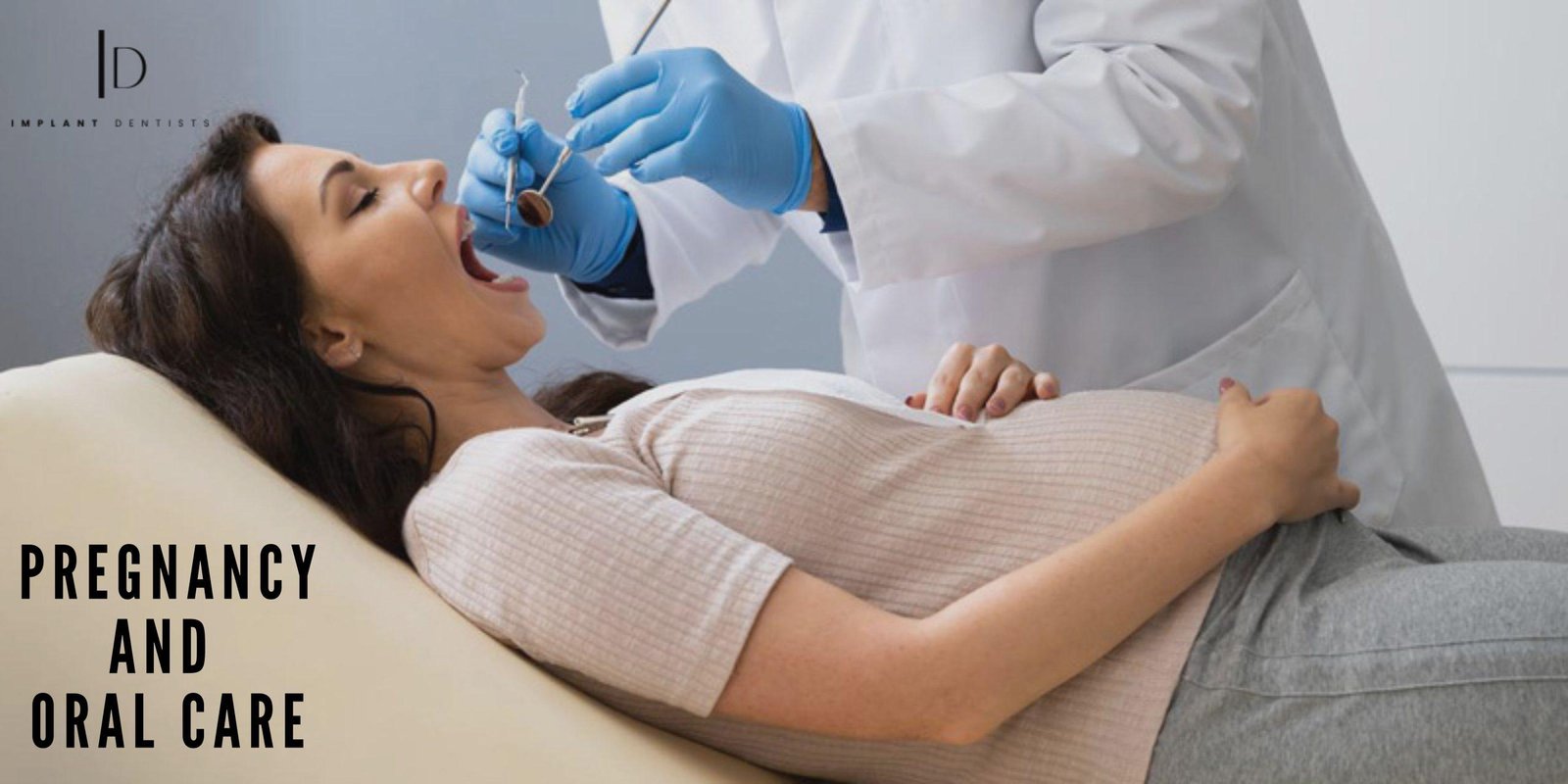
Why Prioritizing Oral Health During Pregnancy Matters?
January 30, 2024
Worried About Loose Teeth? Don’t Panic, Get Help!
January 22, 2024Why Do Teeth Loosen?
- Gum disease: This inflammatory condition, often caused by poor oral hygiene, can damage the tissues and bone that support your teeth, leading to loosening.
- Trauma: A blow to the face or injury to the mouth can damage the supporting structures of a tooth, causing it to loosen.
- Teeth grinding: Chronic teeth grinding, also known as bruxism, can wear down teeth and the surrounding bone, leading to loosening.
- Medical conditions: Certain medical conditions, such as osteoporosis or diabetes, can affect bone health and contribute to lose teeth.
Symptoms to Watch Out For:
- Significant tooth movement: If your tooth is noticeably shifting or feels very loose, it’s important to get it checked out.
- Pain or bleeding: Pain or bleeding around a loose tooth can be a sign of infection or further damage.
- Difficulty chewing or speaking: If a loose tooth is affecting your ability to eat or speak normally, it’s time to see a dentist.
Treatment Options for Loose Teeth:
- Deep cleaning and periodontal therapy: If gum disease is the culprit, deep cleaning and periodontal therapy can help reverse the damage and stabilize the tooth.
- Splinting or bonding: In some cases, a loose tooth can be splinted or bonded to neighbouring teeth for added support.
- Crown lengthening: If gum recession has exposed the root of the tooth, crown lengthening can restore the gum tissue and provide a stable base for the tooth.
- Dental implants: If a loose tooth is beyond saving, dental implants can provide a permanent and natural-looking replacement.
Prevention is Key:
- Practice good oral hygiene: Brush your teeth twice a day, floss daily, and use mouthwash to remove plaque and bacteria that can contribute to gum disease.
- Schedule regular dental checkups and cleanings: Your dentist can identify and address any early signs of gum disease or other problems that could lead to lose of teeth.
- Wear a mouth guard during contact sports: This can help protect your teeth from injury.
- Manage stress: Stress can contribute to teeth grinding, so finding healthy ways to manage stress can be beneficial for your oral health.
Don’t Let Loose Teeth Steal Your Smile:
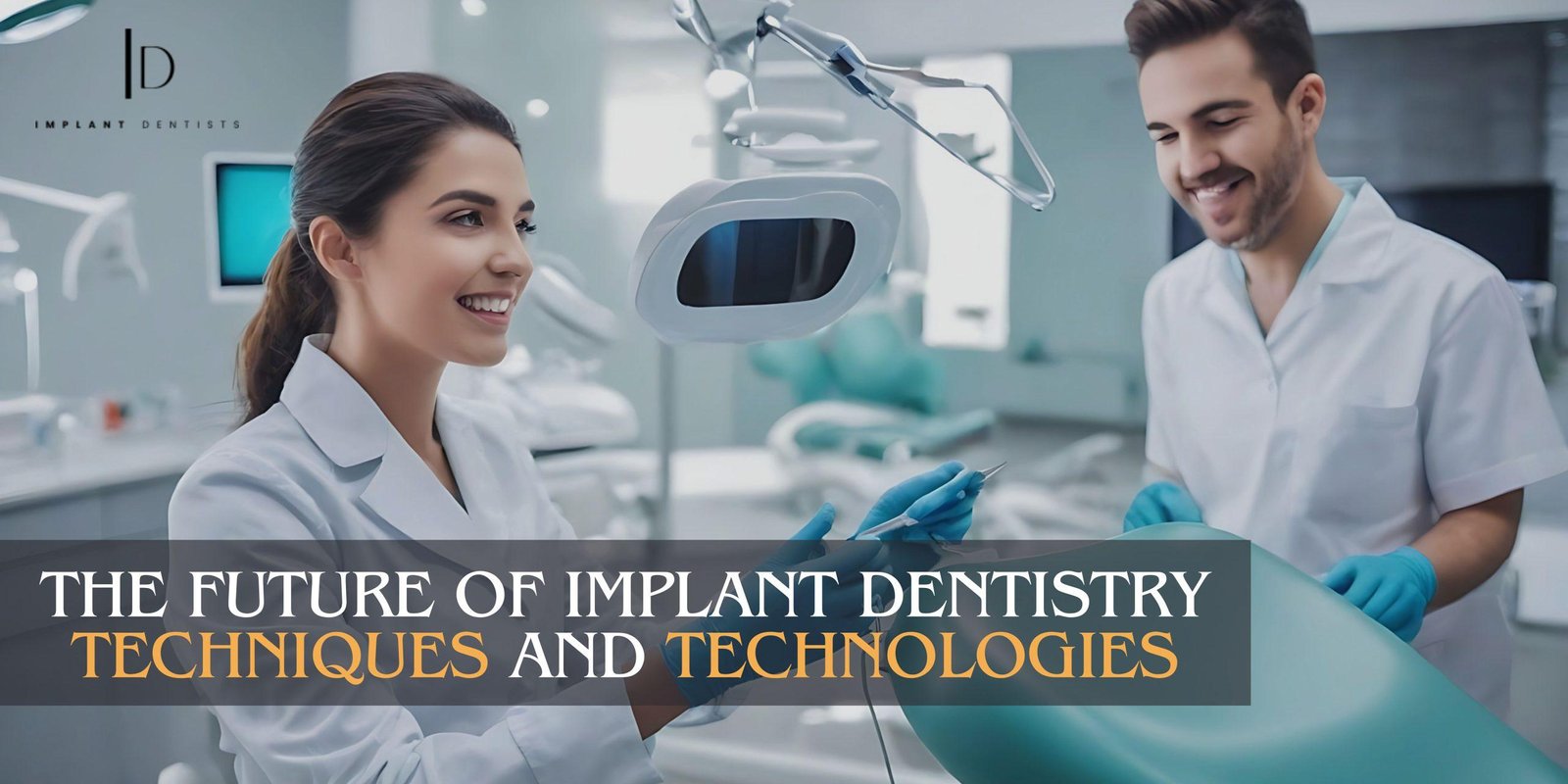
The Future of Implant Dentistry | Emerging Techniques and Technologies
January 18, 2024In recent years, implant dentistry has witnessed significant advancements, ushering in a new era of possibilities for patients seeking durable and aesthetically pleasing tooth replacement options. This blog explores the latest techniques and technologies that are shaping the future of implant dentistry, and the numerous benefits they offer to both patients and dental practitioners.
3D Printing in Implant Manufacturing
In the rapidly evolving landscape of healthcare, 3D printing has emerged as a groundbreaking technology, ushering in a new time of precision and customization in implant manufacturing. This innovative approach to crafting implants has revolutionized the traditional methods, offering unparalleled advantages in terms of design flexibility, patient-specific customization, and accelerated production processes.
- Revolutionizing Precision: Traditionally, implant components were mass-produced, leading to certain limitations in customization. The advent of 3D printing has revolutionized the manufacturing process, allowing for highly personalized implants tailored to each patient’s unique dental anatomy. This not only improves the fit and function of implants but also enhances the overall aesthetic outcome.
- Accelerating Treatment Timelines: With 3D printing, dental laboratories can produce implants faster than ever before. This technology has significantly reduced the time patients spend waiting for their customized implants, enabling quicker treatment timelines and improved patient satisfaction.
Digital Impressions and Virtual Planning
Embark on a transformative journey into the empire of innovation with our cutting-edge service: Digital Impressions and Virtual Planning. In a world driven by technology, we redefine the way you envision and strategize, seamlessly blending the physical and digital landscapes.
- Enhanced Accuracy: Gone are the days of messy and uncomfortable traditional impressions. Digital impressions provide a more comfortable experience for patients, while also delivering highly accurate data for treatment planning. Virtual planning tools allow dentists to meticulously plan implant placement, minimizing the risk of complications and ensuring optimal outcomes.
- Predictable Results: Digital impressions and virtual planning contribute to more predictable results in implant dentistry. Implant Dentists can visualize the entire treatment process before it even begins, leading to increased precision during surgery and a higher likelihood of successful implant integration.
Osseointegration Enhancements
Osseointegration Enhancements refers to cutting-edge advancements in the field of medical and dental science. The aimed at improving the integration of prosthetic devices with the natural bone structure of the human body. It is a crucial process that ensures the stability and functionality of prosthetic implants. Such as dental implants and limb prostheses.
- Smart Implants: Recent advancements in implant materials have led to the development of “smart implants” equipped with sensors. These sensors monitor factors like pressure, temperature, and pH levels in the surrounding tissues. This real-time data helps dentists track the progress of osseointegration and identify any issues early on, leading to improved postoperative care.
Benefits of Adopting Emerging Techniques and Technologies
- Improved Patient Outcomes: The integration of advanced technologies ensures that patients experience enhanced precision, reduced discomfort, and quicker recovery times. This leads to overall improved outcomes and greater patient satisfaction.
- Efficiency for Practitioners: Dental practitioners benefit from the efficiency of modern techniques and technologies, allowing for streamlined workflows, better treatment planning, and more accurate surgical procedures. This not only saves time but also enhances the overall quality of care provided.
- Customization and Aesthetics: The ability to create highly customized implants using 3D printing, along with precise digital planning, allows for superior aesthetic results. Patients can enjoy natural-looking and seamlessly integrated dental implants that match their individual features.
- Enhanced Monitoring and Aftercare: Smart implants and bioactive coatings contribute to improved monitoring of the healing process, enabling early detection of potential issues. This results in better aftercare and long-term success rates for dental implant treatments.
Read about Dental Problems, issues and Effective Treatments!
Conclusion
The future of implant dentistry is undeniably exciting, with emerging techniques and technologies transforming the landscape. As these innovations continue to evolve, patients can expect more personalized, efficient, and aesthetically pleasing solutions. While dental practitioners benefit from enhanced precision and streamlined workflows. Embracing these advancements ensures a brighter future for the field of implant dentistry.
Ignite Your Confidence with a Dazzling Smile – Because Your Smile Deserves to Shine Bright!
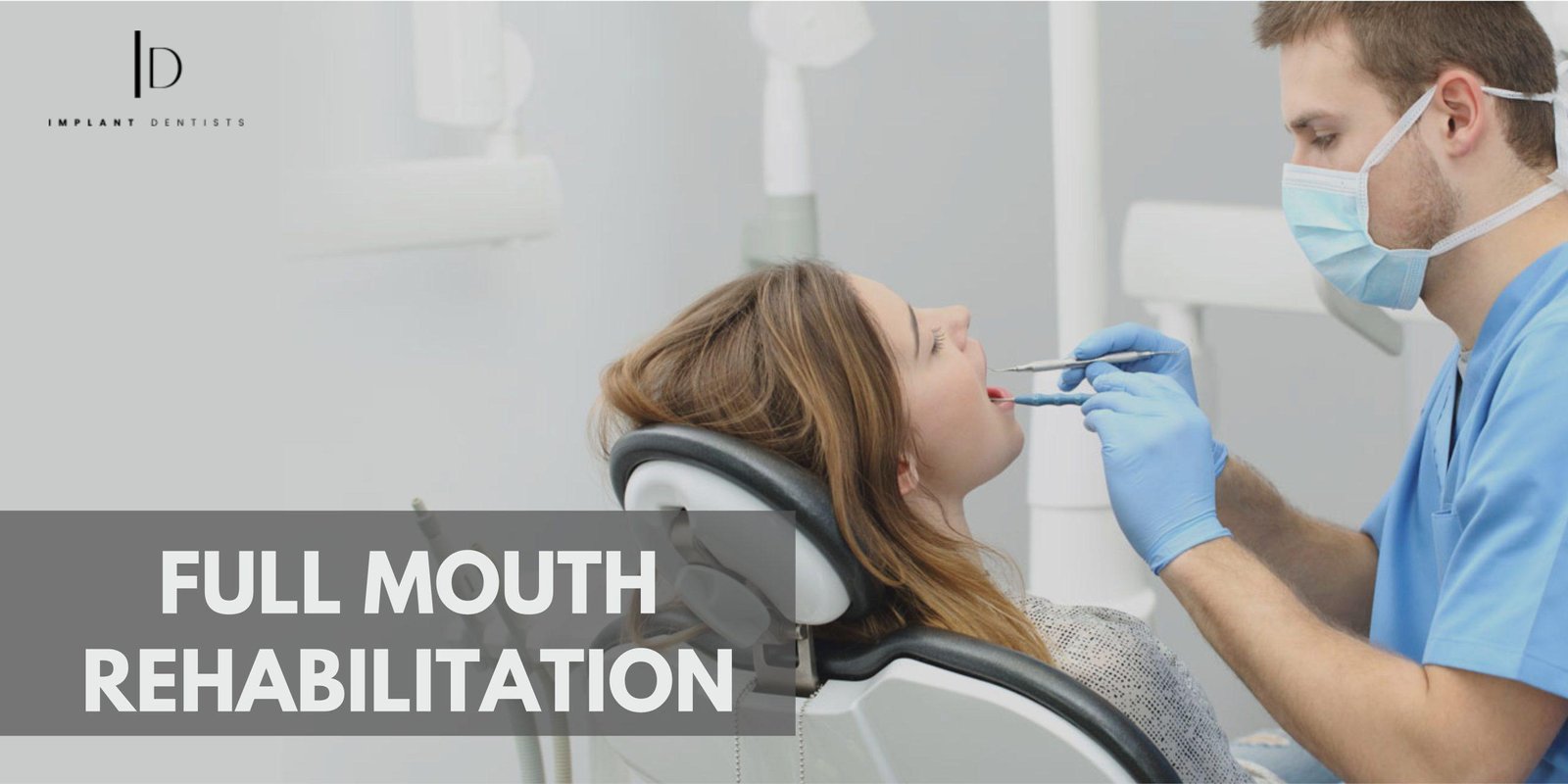
Implant Solutions for a Radiant Smile| Full Mouth Rehabilitation in Crewe, United Kingdom
January 16, 2024Full mouth rehabilitation is a comprehensive dental treatment that aims to restore oral health and functionality. In recent years, dental implants have played a pivotal role in revolutionizing full mouth rehabilitation procedures, offering patients in Crewe, United Kingdom. A lasting solution to various dental issues. Now, we explore the significance of implants in full mouth rehabilitation. The benefits they bring to individuals seeking a complete dental transformation.
Understanding Full Mouth Rehabilitation
Full Mouth Rehabilitation, also known as full mouth restoration, is a comprehensive and personalized dental procedure designed to address multiple dental issues. It restores optimal oral health, function, and aesthetics. This advanced and transformative treatment involves a meticulous combination of various dental procedures. This tailored to the unique needs of each individual.
Patients seeking Full Mouth Rehabilitation often present with a range of dental concerns, such as missing teeth, extensive tooth decay. Worn-down enamel, gum disease, bite problems, or a combination of these issues. The primary goal of Full Mouth Rehabilitation is to provide a holistic and integrated approach to address these concerns. This is ultimately enhancing both the functionality and appearance of the entire mouth.
Explore Dental Implants
Dental implants are artificial tooth roots that are surgically placed into the jawbone to support replacement teeth or bridges. There are several types of dental implants, classified based on various factors such as implant design, materials used, and the surgical procedure.
Here are some common types of dental implants:
- Single Tooth Implants: Used when a single tooth is missing, a single implant is placed into the jawbone, and a crown is attached to it.
- Multiple Tooth Implants: Used when several adjacent teeth are missing, implant-supported bridges are anchored to implants rather than natural teeth.
- Full Arch Implants: These are used when an entire arch of teeth (upper or lower) needs to be replaced. All-on-4 refer to the number of implants used to support a full arch of teeth.
- Zygomatic Implants: These implants are longer and are anchored into the cheekbone (zygoma) instead of the jawbone. They are used when there is insufficient bone in the upper jaw.
- Mini Implants: Smaller in diameter than traditional implants, mini implants are often used in situations where there is limited space or bone.
The Role of Implants in Replacing Missing Teeth
Dental implants play a crucial role in replacing missing teeth. This providing a durable and natural-looking solution for individuals with one or more missing teeth. The process involves surgically placing a metal post into the jawbone. It serves as a stable anchor for a replacement tooth or a bridge.
Here are key aspects of the role of implants in replacing missing teeth:
- Stability and Support: Dental implants offer stability and support comparable to natural teeth. The implant fuses with the jawbone through a process called osseointegration, creating a strong foundation for the replacement tooth.
- Improved Functionality: Unlike removable dentures, dental implants function like natural teeth. They allow for normal biting, chewing, and speaking, providing a higher level of comfort and functionality.
- Preservation of Jawbone: When a tooth is lost, the jawbone in that area can start to deteriorate over time due to lack of stimulation from chewing. Dental implants help preserve the jawbone by acting as artificial tooth roots and preventing bone loss.
- Natural Appearance: Implants are designed to look and feel like natural teeth. The replacement tooth, also known as a crown, is custom-made to match the colour, shape, and size of the surrounding natural teeth, ensuring a seamless and natural appearance.
- Longevity: With proper care and maintenance, dental implants have a high success rate and can last for many years, even a lifetime. This makes them a durable and long-term solution for replacing missing teeth.
Benefits of Implants in Full Mouth Rehabilitation
- Enhanced Aesthetics and Confidence: Implants provide a natural-looking appearance, restoring not only the functionality of the teeth but also the aesthetics. This, in turn, boosts confidence and self-esteem for individuals undergoing full mouth rehabilitation.
- Improved Oral Functionality: Dental implants allow for improved chewing and speaking abilities, providing patients with a level of comfort and functionality comparable to natural teeth.
- Long-Term Durability: One of the significant advantages of dental implants is their long-term durability. With proper care, implants can last a lifetime, making them a cost-effective and sustainable choice for full mouth rehabilitation.
- Stability and Strength: Dental implants provide a stable and strong foundation for the replacement of multiple teeth. This stability is crucial in full mouth rehabilitation, where the goal is to restore the entire dentition.
- Natural Feel and Functionality: Implants mimic the natural function and feel of teeth. This is particularly important in full mouth rehabilitation, as patients aim to regain the ability to bite, chew, and speak comfortably. Just like they would with natural teeth.
Conclusion:
In Crewe, United Kingdom, dental implants have become an integral part of full mouth rehabilitation, offering patients a transformative solution to various dental challenges. The combination of advanced technology and skilled dental professionals ensures that individuals seeking full mouth rehabilitation in Crewe can enjoy the benefits of a restored smile. This improved oral health, and enhanced overall well-being.
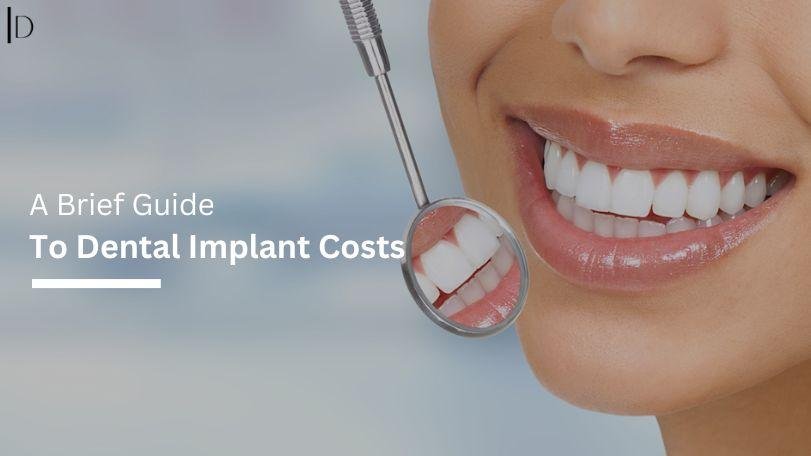
Guide to Dental Implant Costs in the UK: Your Questions Answered
January 10, 2024Dental implants are a revolutionary solution for replacing missing teeth, offering a natural-looking and long-lasting alternative to dentures or bridges. But before you embark on this journey, understanding the costs involved is crucial. In this comprehensive guide, we’ll delve into everything you need to know about dental implant costs in the UK, from factors that influence the price to financing options and cost-saving tips.
Understanding the Price Range: The Implant Ecosystem
When it comes to dental implants, a one-size-fits-all price tag doesn’t exist. The cost can vary significantly depending on several factors, including:
- The number of implants required: Replacing a single tooth will naturally cost less than restoring an entire arch.
- Type of implant used: Premium or advanced implant systems may come at a higher price point.
- Location of the dentist: Prices can differ based on the practice’s overhead costs and geographical location.
- Complexity of the procedure: Bone grafting or sinus lift surgeries add to the overall treatment cost.
Breaking Down the Costs: A Look at the Numbers
To give you a clearer picture, here’s a general breakdown of dental implant costs in the UK:
- Single implant: The average cost ranges from £1,500 to £3,000, including the implant, abutment, and crown.
- Multiple implants: Replacing several teeth can cost between £4,000 and £8,000.
- Full-arch restoration: All-on-four or teeth-in-a-day treatments typically range from £10,000 to £20,000.
Financing Your New Smile: Making Implants Affordable
The high upfront cost of dental implants can be a concern for many. Thankfully, several financing options can make your dream smile a reality:
- Dental payment plans: Many practices offer in-house financing plans with low-interest rates and flexible monthly payments.
- Medical loans: Some banks and lenders offer medical loans specifically for dental procedures.
- Credit cards: Using a credit card with 0% introductory APR financing can be a viable option for eligible individuals.
Saving Smart: Cost-Effective Tips for Implant Treatment
Before committing to treatment, explore ways to save on your dental implant costs:
- Shop around and compare prices: Get quotes from several dentists in your area to find the most competitive offer.
- Consider alternative materials: Opting for zirconia crowns instead of porcelain can bring down the cost slightly.
- Look for special offers and promotions: Some dentists offer discounts or package deals for multiple implants.
Beyond the Numbers: Investing in Your Oral Health
While the cost of dental implants is a significant factor, remember that it’s an investment in your long-term oral health and overall well-being. Implants offer numerous benefits, including:
- Improved oral function: Chewing, speaking, and smiling become effortless with the stability and strength of implants.
- Enhanced confidence: A natural-looking smile can boost your self-esteem and social interactions.
- Superior long-term value: Implants are highly durable and can last for decades, making them a cost-effective solution in the long run.
Making an Informed Decision: The Next Steps
By understanding the costs, financing options, and benefits of dental implants, you can make an informed decision about whether this treatment is right for you. Remember to consult with a qualified dentist to discuss your individual needs and receive a personalized treatment plan with a clear cost breakdown. With careful planning and research, you can achieve your dream smile and reap the rewards of improved oral health and confidence.
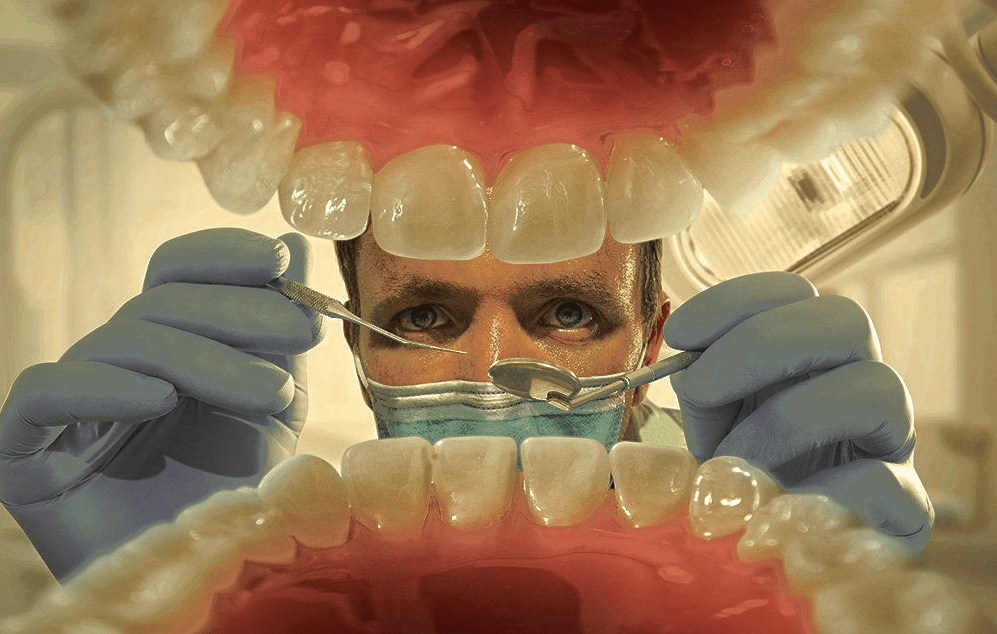
Affordable implant Dental Problem Solution in the UK
December 27, 2023The Implant Dentists in the United Kingdom are professionals specializing in dental implantology, a field focused on the restoration and replacement of missing teeth using affordable implant dentists. These specialists undergo extensive training and possess advanced knowledge in oral surgery, prosthodontics, and implant dentistry techniques. They offer a range of services catering to patients with missing teeth, damaged teeth, or those seeking a permanent solution to restore their smile and oral functionality. These services typically include thorough patient assessments, treatment planning, implant placement surgeries, and post-operative care. Implant dentists in the UK utilize cutting-edge technology and follow modern techniques to ensure precise and successful implant placement. They work closely with patients to understand their unique dental needs, discussing various treatment options and customizing solutions to achieve optimal results.
Benefits of Implant Dentists:
- High Success Rates: Implant dentists in the UK boast high success rates due to their specialized training and experience, ensuring a greater likelihood of successful implant procedures.
- Expertise in Advanced Techniques: These professionals are well-versed in the latest advancements in implant dentistry, offering cutting-edge techniques for optimal results.
- Personalized Patient Care: Implant dentists prioritize individualized treatment plans, catering to each patient’s unique needs and concerns.
- Enhanced Oral Health: By choosing an implant dentist, patients can experience improved oral health, including better speech, chewing ability, and prevention of bone loss.
Understanding the Affordable Dental Implants
Dental implants are artificial tooth roots made of titanium that are surgically placed into the jawbone beneath the gum line. These serve as a stable foundation for replacement teeth or dental prosthetics, such as crowns, bridges, or dentures. The process involves osseointegration, where the implant fuses with the jawbone over time, providing a strong and durable base for artificial teeth.
Making Dental Implants Affordable
- Insurance Coverage: Check with your dental insurance provider to understand coverage options for dental implants.
- Payment Plans: Many dental clinics offer flexible payment plans or financing options to help manage the cost of implants.
- Comparative Analysis: Research and compare prices from different dental clinics to find a cost-effective option without compromising quality.
- Clinic Packages and Offers: Some clinics offer special packages or discounts for dental implant procedures.
Benefits of Dental Implants
- Enhanced Quality of Life: Dental implants look, feel, and function like natural teeth, providing improved comfort and confidence in eating, speaking, and smiling.
- Long-term Solution: With proper care, dental implants can last for decades, offering a long-term tooth replacement option.
- Preservation of Jawbone: Implants stimulate the jawbone, preventing bone loss and preserving facial structure.
- Natural Appearance: Implants are customized to match the natural colour and shape of your teeth, ensuring a seamless smile.
Exploring the Cheap Dental Implants
Dental implants offer a transformative solution for individuals seeking to restore their smiles. While cost can be a concern, there are various avenues to explore affordable implants dental without compromising on quality or efficacy. Let’s talk about the world of affordable dental implants in the UK, providing insights, options, and the benefits they offer.
Benefits of Cheap Dental Implants in the UK:
- Financial Accessibility: Affordable dental implants make this transformative procedure accessible to a wider demographic, ensuring that individuals with varying budgets can benefit from the treatment.
- Enhanced Quality of Life: By restoring missing teeth with implants, individuals can enjoy improved oral health, better chewing ability, and enhanced speech, ultimately leading to a better quality of life.
- Aesthetic Improvement: Dental implants not only restore functionality but also enhance facial aesthetics by maintaining bone structure and providing a natural-looking smile.
- Long-term Investment: Despite being cost-effective, cheap dental implants offer long-term benefits. They are durable and can last for many years with proper care, making them a wise investment.
Exploring to Cheap Options for Missing Teeth
Losing a tooth or multiple teeth can significantly impact one’s confidence, oral health, and daily life. Fortunately, several affordable options are available in the UK to address missing teeth, ensuring both functionality and aesthetics without breaking the bank.
Understanding the Importance of Addressing Missing Teeth
- Impact of Missing Teeth: Exploring the consequences of untreated missing teeth on oral health, speech, and self-esteem.
- Importance of Timely Treatment: Highlighting the significance of promptly addressing missing teeth to prevent further oral health issues.
Cost-Effective Solutions for Missing Teeth
- Dental Implants: Discussing affordable implant options and potential financing plans available in the UK.
- Dentures: Exploring the cost-effective varieties of dentures and their advantages for individuals seeking budget-friendly solutions.
- Dental Bridges: Detailing the cost-efficient options for dental bridges and their suitability for replacing missing teeth.
Benefits of Dental Solutions
- Restoration of Functionality: How affordable options restore proper chewing, speaking, and overall oral function.
- Enhanced Aesthetics: Discussing how these budget-friendly solutions improve smiles and boost self-confidence.
- Improved Oral Health: Exploring how addressing missing teeth prevents further dental issues and preserves oral health in the long run.
Conclusion
For individuals seeking affordable dental implants or cost-effective options to replace missing teeth in the United Kingdom, exploring the services provided by skilled implant dentists is crucial. The pursuit of cheap dental implants should not compromise on quality or expertise, and reputable implant dentists offer viable solutions that balance affordability with high standards of care. By consulting with experienced professionals specializing in affordable dental implants, individuals can access suitable and cost-conscious options for replacing missing teeth without sacrificing the quality and durability of treatment.
Discover Affordable Dental Implants by Expert Implant Dentists in the UK! Say goodbye to missing teeth with our cost-effective solutions.

Understanding Dental Problems: Common Issues and Effective Treatments
December 12, 2023Maintaining good oral health is crucial for overall well-being. Dental problems can affect people of all ages, causing discomfort and impacting daily life. However, with advancements in dentistry, there are numerous effective treatments available for various dental issues. Now, we’ll explore common dental problems and the treatments designed to restore dental health.
Tooth Decay
Tooth decay, also known as dental caries or cavities, is a common oral health issue characterized by the gradual destruction of the tooth structure caused by acids produced by bacteria. It occurs when plaque, a sticky film of bacteria, builds up on teeth and interacts with sugars or starches from food, producing acids that attack tooth enamel.
-
Causes:
- Plaque build-up
- Poor oral hygiene
- Sugar and acid consumption
-
Treatment for tooth decay:
-
- Fluoride treatments: In the early stages of tooth decay, fluoride treatments may help remineralize the enamel and reverse the damage. Fluoride helps strengthen the enamel, making it more resistant to acid attacks.
- Dental fillings: If the decay has progressed and caused a cavity, the dentist will remove the decayed portion of the tooth and fill the cavity with materials such as composite resin, amalgam, or porcelain to restore the tooth’s structure and function.
- Dental crowns: For more extensive decay that has weakened the tooth, a dental crown may be necessary. A crown covers the entire tooth to protect and strengthen it.
Gum Disease
Gum disease, also known as periodontal disease, refers to an infection of the tissues that support and surround the teeth. It typically starts with the accumulation of plaque, a sticky film of bacteria that forms on the teeth. When plaque isn’t adequately removed through regular brushing and flossing, it can harden into tartar, which further irritates the gums.
-
Causes:
- Hormonal changes
- Smoking
- Diabetes
-
Treatment for Gum Disease:
-
- Professional Dental Cleaning: For mild cases of gum disease (gingivitis), a professional cleaning by a dentist or dental hygienist can remove plaque and tartar build-up, helping to reverse the condition.
- Scaling and Root Planing: This procedure involves deep cleaning below the gum line to remove plaque, tartar, and bacterial toxins from the root surfaces of the teeth. It helps to smooth the root surfaces, allowing the gums to reattach to the teeth.
- Medications: Antibacterial mouth rinses, antibiotic gels, or oral antibiotics might be prescribed to help control infection and promote healing.
- Surgery: In advanced cases of periodontitis, surgical treatments such as flap surgery (pocket reduction surgery), bone grafts, tissue grafts, or guided tissue regeneration may be necessary to restore damaged tissues and bone.
Tooth Loss
Tooth loss refers to the condition where one or more teeth are missing, either due to injury, decay, gum disease, or other oral health issues. Losing teeth can have significant impacts on an individual’s ability to chew food properly, speak clearly, and maintain a confident smile. It can also lead to various dental and oral health complications if left untreated.
-
Causes:
- Gum disease
- Trauma or injury
- Ageing
-
Treatment for Tooth Loss:
-
- Dental Implants: These are artificial tooth roots made of titanium that are surgically placed into the jawbone. They provide a stable foundation for replacement teeth (crowns) and can function and look like natural teeth
- Dentures: These are removable appliances that replace missing teeth and surrounding tissues. Partial dentures can replace a few missing teeth, while complete dentures are used when all teeth in an arch are missing.
- Bridges: A dental bridge consists of one or more artificial teeth anchored in place by crowns on the adjacent natural teeth. It “bridges” the gap created by missing teeth.
Oral Cancer
Oral cancer refers to cancers that develop in the mouth or oral cavity. This includes cancers of the lips, tongue, gums, inner lining of the cheeks, roof, and floor of the mouth. Oral cancer can manifest as a sore, growth, or ulcer in the mouth that doesn’t heal. Some common risk factors associated with oral cancer include tobacco use (smoking or chewing), excessive alcohol consumption, human papillomavirus (HPV) infection, prolonged sun exposure to the lips, and a diet low in fruits and vegetables.
-
Causes:
- Tobacco use
- Excessive alcohol consumption
- HPV (Human Papillomavirus)
- Sun exposure (lip cancer)
-
Treatment for Oral Cancer:
-
- Surgery: This involves removing the tumour and possibly some surrounding tissue. In advanced stages, surgery may involve removing lymph nodes in the neck as well.
- Radiation therapy: High-energy rays are used to kill cancer cells. It can be used alone or in combination with surgery or chemotherapy.
- Targeted therapy: This treatment targets specific abnormalities in cancer cells and may be used in certain cases.
Conclusion:
Dental problems can range from common issues like cavities to more severe conditions such as oral cancer. However, early detection and appropriate treatment can prevent complications and restore oral health. Regular dental check-ups, maintaining proper oral hygiene, and seeking prompt treatment for any dental concerns are essential for a healthy smile. With advancements in dental technology and various treatment options available, individuals can regain their confidence and maintain a bright, healthy smile for years to come.
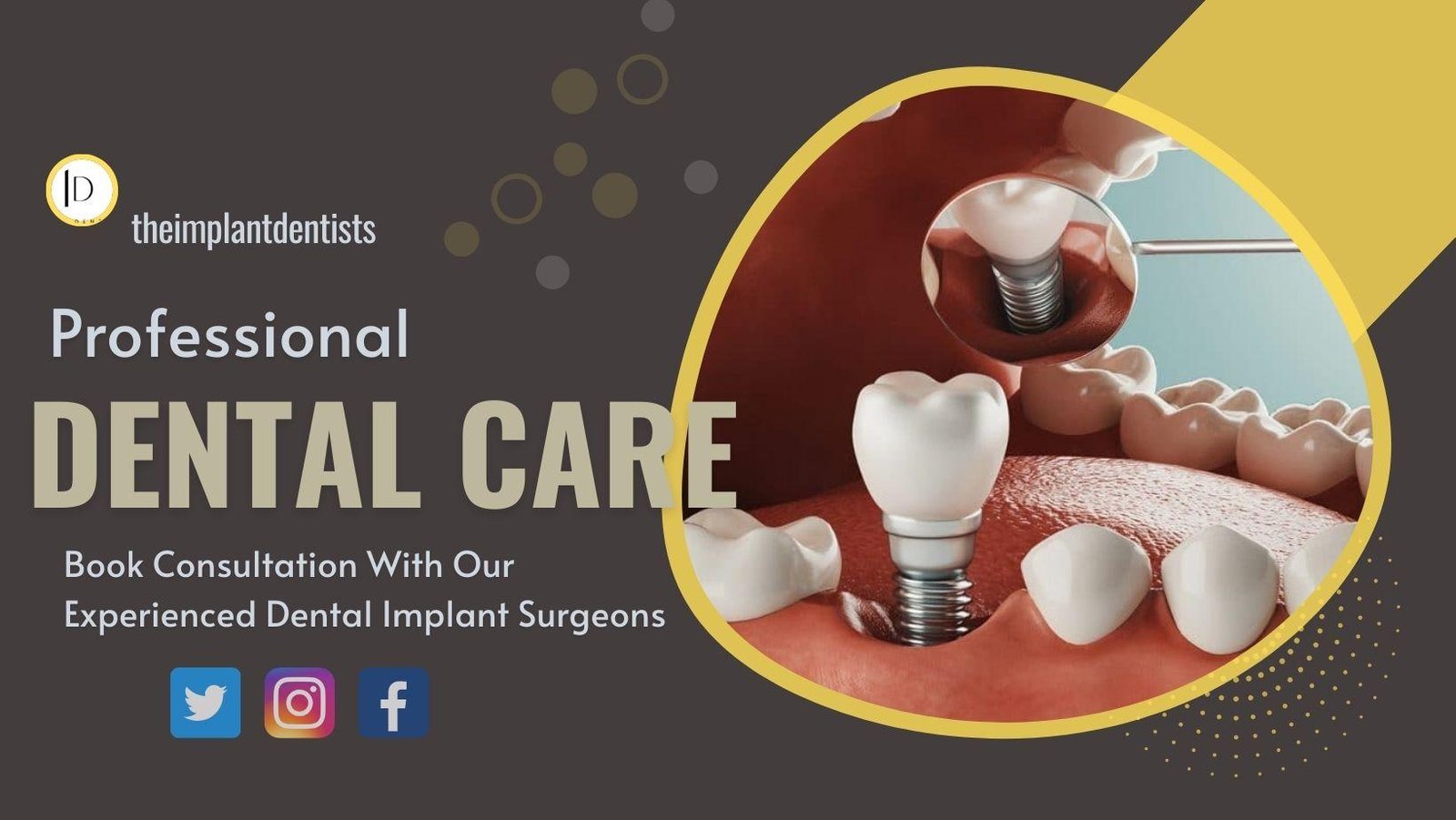
The Implant Dentists: Your Premier Destination for Tooth Replacement Solutions
December 5, 2023At The Implant Dentists, we’re dedicated to transforming smiles and restoring confidence through our exceptional tooth replacement solutions. Our commitment lies in providing top-notch dental care, offering a comprehensive range of options tailored to meet diverse dental needs across the UK. With a passion for enhancing smiles and improving lives, our team strives to deliver excellence in every aspect of our service. We prioritise patient comfort and satisfaction above all, ensuring a seamless and positive experience with every visit.
Comprehensive Solutions for Varied Dental Needs
We understand the impact of tooth loss, be it a single missing tooth or multiple gaps, and its effect on your confidence and oral health. That’s why we offer an array of cost-effective solutions, including best dental implants and conventional bridge dental work. We aim to ensure that every individual has access to quality tooth replacement solutions without financial strain. With a focus on innovation, we continually explore advanced techniques to provide cutting-edge dental solutions that cater to evolving dental needs.
Embark on a Transformational Journey
For those seeking a complete smile transformation, our specialised services include full jaw dental implants and implant over dentures. These transformative options are designed to not just restore your smile but also enhance your overall oral functionality, giving you the confidence to live life to the fullest. Our dedicated team of specialists collaborates to ensure that each treatment plan is meticulously crafted, aligning with the highest standards of dental care. We believe in empowering our patients by providing comprehensive education and support throughout their dental journey.
Convenient Access to Quality Dental Care
Located in Stafford-shire, our practice serves the communities of Stafford, Stoke, Tamworth, Lichfield, Crewe, and Congleton. We prioritise convenience, ensuring that individuals across these areas have easy access to premium dental care. Our dedicated team is committed to delivering exceptional services to our local community. We emphasise a patient-centred approach, where your comfort and well-being are at the forefront of every treatment. Our state-of-the-art facility is equipped with the latest technology, ensuring precise and efficient dental procedures.
Say Goodbye to Dental Concerns
Loose or broken teeth should never hinder your lifestyle or confidence. Take the step towards regaining control of your oral health and confidence by exploring our tooth replacement solutions. With our expertise and commitment to excellence, we aim to empower you to smile freely and live life without limitations. Our compassionate team of professionals understands the importance of a healthy smile and works tirelessly to provide personalised care that exceeds expectations.
Personalised Care Tailored to You
At The Implant Dentists, we understand that each individual’s dental needs are unique. That’s why we believe in personalised care. When you book a consultation call with us, our expert team takes the time to understand your specific requirements and desires. We’re dedicated to creating a tailored treatment plan that aligns perfectly with your goals, ensuring a journey toward the smile you’ve always dreamed of. Our commitment to continued education and training enables us to offer the most advanced and effective treatments available.
Your Journey to a Confident Smile Begins Here
Our mission is to guide you on your journey to a confident smile. By choosing The Implant Dentists, you’re opting for not just tooth replacement but a transformational experience. Our team is committed to providing compassionate care, utilising cutting-edge technology, and delivering exceptional results that exceed your expectations. We believe in building lasting relationships with our patients, fostering trust and understanding for a lifetime of healthy smiles.
Book Your Consultation Call Today
Don’t let tooth loss hinder your happiness or hold you back from enjoying life’s precious moments. Your dream smile is within reach. Book your consultation call today with The Implant Dentists. Let us help you take the first step towards transforming your smile and enhancing your quality of life. Our friendly and knowledgeable staff are here to address any concerns and guide you through your dental journey with care and expertise.
